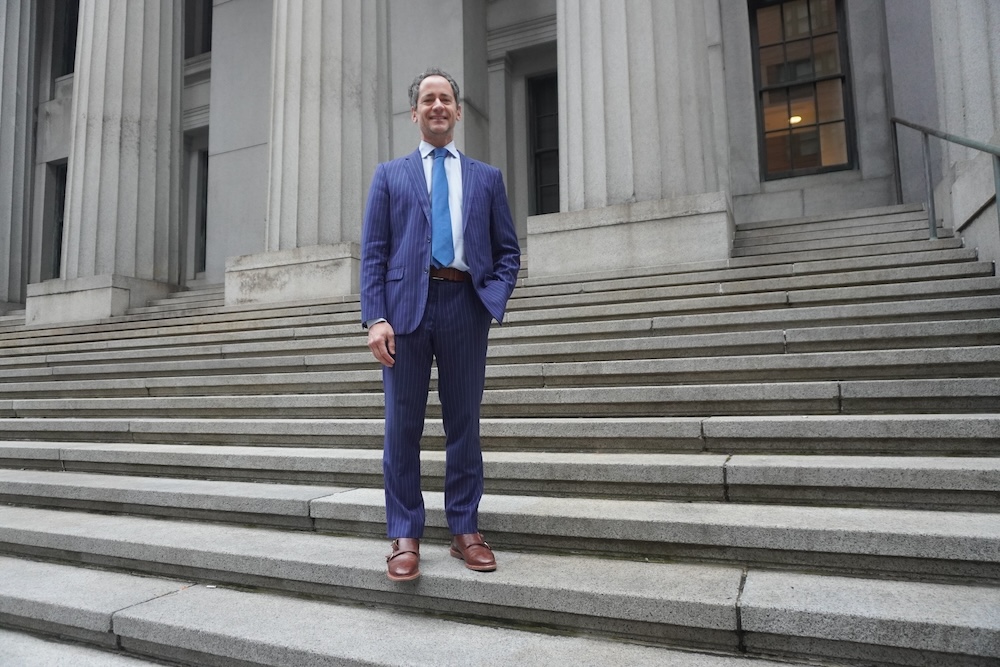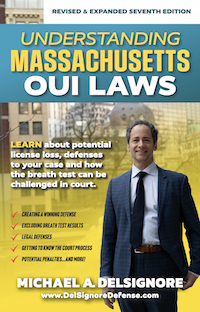Boston 2nd Offense OUI Lawyer
Attorney Michael DelSignore is a Boston OUI Lawyer that can help you when charged with a second offense OUI. If you are facing a Second Offense OUI, you likely have a lot of questions; Attorney Michael DelSignore will guide you through the process and help you make the best decision for yourself on your case.
Second Offense OUI License Implications:If you took a breath test, you face a 30 day suspension for failing a breath test. You can get your full license back after 30 days. You should request a phone hearing almost immediately so you do not want any additional time after the 30 days to reinstate.
If refused a breath test, you face a three-year license suspension for breath test refusal. If you are found not guilty on the OUI charge, you may be able to reinstate prior to the expiration of the three-year breath test refusal suspension expiring.
LICENSE IMPLICATIONS: WHEN WAS YOUR 1ST OFFENSEIf your two OUI offense are more than 10 years apart, you are eligible for a significantly reduced license suspension. Normally, when you face a second offense, you would suffer a two year license loss if convicted of OUI. However, if your two offenses are ten years apart, you are eligible for what is referred to in Court as a Cahill Disposition or Second Chance 1st Offender. If the Court treats your second offense as a first offense, meaning you receive a 45-90 day license loss with the requirement you do the 24D alcohol education program, you would be eligible to get your license back:
- If you took a breath test, you will be able to get your license back with an interlock device for two years;
- If you refused a breath test, you will have the interlock for a total of five years. You can apply for a hardship on the 3 year suspension, plus the 45 days, during that time period you will have the interlock; once you are eligible to remove the hardship hours, you will have your full license however with an interlock restriction for two additional years.
If your two OUI Offenses are within ten years, and you refused a breath test, you essentially need to win the case to drive prior to three years. There is an appeal of the refusal suspension; however, those appeals are rarely allowed so if you do not win your OUI case it is unlikely you would drive prior to three years. Attorney DelSignore is highly successful defending OUI charges and can help obtain a not guilty verdict on your case.
Attorney DelSignore wants you to understand the license implications of being charged with OUI; the license consequences of your case will always be known so make sure you understand them.
Why you can win your case?
OUI is a Crime of the Officer’s OpinionOUI cases in Massachusetts are based on very subjective evidence and scientifically flawed breath test evidence. An OUI crime is a crime of opinion; think about this for a second, with any other type of criminal charge there is evidence of a crime, with an OUI there is merely an opinion. The evidence is very subjective.
The opinion of the officer is often formed quickly and based on limited information. The officer does not know anything about your medical condition, how you respond to stress, what your prior experience with police officers is, whether you were tired, or what you are going through that day. The officer will rush through a series of tests to form that opinion. These Field Sobrieyt tests typically are the
- Nine Step walk and turn;
- One Leg Stand
- And Horizontal Gaze and Nystagumus Test
- Sometimes an Alphabet or Count Backwards Test
The HGN test is almost always given but never used in Court. The two tests that are most frequently used in Court and the two balancing tests the One Leg Stand and Nine Step Walk and Turn.
The One Leg stand tests is difficult for people to do even without consuming alcohol and is easier for people that are in better physical shape or naturally have good balance. It requires you to hold your foot up off of the ground 6 inches until the Officer tells you to stop. The difficulty with this test is you are not told how long you are to keep your foot up. This is a very common question people ask. When Attorney DelSignore hears that question in the video, it supports the inference you are paying attention and not drunk; it is a logical question anyone would ask.
There are many ways to discredit the reliability of this test; Attorney DelSignore has seen video where the officer is talking during the test; where one officer interjects when the other officer is given the instructions. There are many flaws with this exercise and when Attorney DelSignore reviews your report, he will help you understand the best ways to attack the officer’s opinion as to how you performed on this test.

The Nine Step walk and turn requires you to walk out nine steps turn and take nine steps back, heel to toe fashion. Many of the issues the officer may see in the report are relatively minor in Attorney DelSignore view; it is not uncommon to see reports mention, failing to maintain heel to toe or stepping off of the line. When cross examining the officer, Attorney DelSignore will try to establish that the officer did not see major sign of impairment, like stumbling or staggering.
Contrasting Field Sobriety Tests with Other parts of the Arrest: `Police officers are taught that someone under the influence should show sign of impairment consistent throughout the encounter. Attorney DelSignore will point out every area where you show good balance and coordination unrelated to the field tests to demonstrate that if you were drunk the signs would be consistent throughout the encounter. The inconsistency shows that alcohol was unlikely impairing you and more importantly, that at minimum, there is reasonable doubt. That is all we have to prove to help you win the case; that there is doubt meaning the following:
- That the tests could have two different explanations, being tired or alcohol;
- That other factors could impact the tests;
- That there were signs inconsistent with impairment;
- That you did not seem impaired at other points in the encounter which is inconsistent with how a person who was drunk would act.
- That the evidence, while perhaps being enough to arrest you, does not meet the very high burden of proof beyond a reasonable doubt, which means proof to a near moral certitude and is the highest degree of proof in matters relating to human affairs.
When you are charged with a Second Offense OUI in Boston, Call or Text Attorney DelSignore at 781-686-5924.
 Massachusetts DUI Attorney DelSignore Law Home
Massachusetts DUI Attorney DelSignore Law Home
